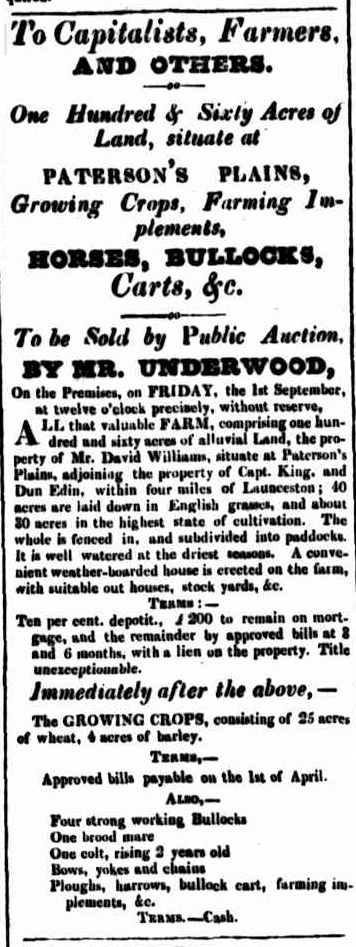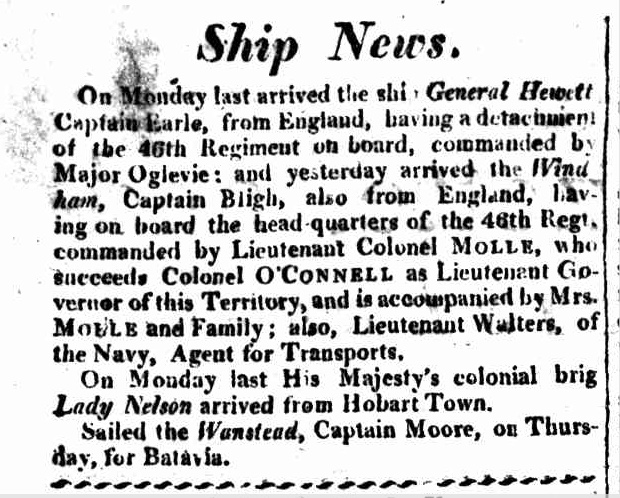of Patterson’s Plains
Allow me to digress briefly before proceeding to the matter at hand:— David Williams and Henry Nicholls were both masters to whom James Dyson, convict, was briefly assigned to. How briefly? Two months in the case of Williams, Three days in the case of Nickolls. If I ever finish the book I am writing, this part of his life warrants about a page at most. Researching these two to understand their tiny part in his story has taken the best part of two weeks. This is why progress has been so slow and I’ve yet to even begin writing that page.
Van Diemen’s Land settler David Williams was winding up his affairs in that colony when convict James Dyson was assigned to him about 14 July 1837

Sixteen days after the land on the Patterson’s Plains went up for auction, he returned Dyson to the Depot at Launceston. — “His master no longer requiring his service”. Dyson was next assigned to… But that’s another story.
The biography of David Williams I have put together here is markedly different from some other accounts of his life posted elsewhere. I don’t believe he was ever a convict in NSW or VDL, nor do I believe it was he who died in the year 1841 falling off a cart while drunk near Hobart. If that is a disappointment to any family members, fear not — the truth is far more interesting, and there are far more avenues of research to wander down than I have even touched on.
David Williams was born before 1792 somewhere in the British Isles. He enlisted in the 46th South Devonshire Regiment of the British Army sometime during the last years of the Napoleonic War. He departed England late in 1814 on the the troop ship Windham bound for New South Wales, then Van Diemen’s Land.

Corporal Williams stayed in NSW for a time, but he resigned from the army at Port of Launceston sometime about the beginning of the year 1817. According to his record, he served 7 years. Do the sums — Someone is lying.
He had definitely been farming in the Launceston district for a while by 1822, for he was then selling grain to the government commissariat at Port Dalrymple.
For those family members bewailing I stripped their heritage of Australian Royalty — despair not. On 2 January 1826 at Launceston, he married Jane Jones, his assigned convict serving girl. Jane was then only one year into a seven year sentence for “Stealing Silk Handkerchiefs from a shop” in Northumberland. She did not cease being a convict after marriage, so she was lucky that an accusation of “Stealing sundry articles of Wearing apparel the property of Mr Naylor from his house in Launceston” did not stick.
According to her conduct record (that ends abruptly after 29 April 1826) she was already married to someone named John Hamilton back in England. On her Launceston marriage certificate however, she states she was a spinster. Someone in officialdom slipped up again!
Their first child, a daughter named Hannah, was born at Patterson’s Plains on 9 July 1828.
The following year, grimmer tidings were to hand. They employed a stock-keeper on their estate. One Saturday morning he vanished never to be seen again. No one had any doubt back then that he’d been murdered.
David Williams (junior) was born on 25 March 1830. Later that year his father operated the district Pound for Patterson’s Plains.
By 1832, he also acquired a Publican’s licence for the district. What was it about former British Army Corporals and taverns?
Still, the next year 1833, David Williams was mixing with the high and mighty of the district on civic matters concerning roads and bridges about the North Esk River. Later that year he breached some sort of regulation concerning his Liquor licence and was fined £2.
In 1834 David Williams had two grants near Launceston confirmed. Presumably this meant he was now in possession of the title deeds for his properties on Patterson’s Plains.
The record goes dark for the next three years.
1837: An individual named Thomas Prosser claims David Williams and Joseph Bond Clarke obtained some promissory notes from him by false pretences. This allegation is never tested in court. Then in February that same year, Williams declares he has lost a promissory note to the value of £40 and threatens anyone who would dare cash that note in.
His property goes up for sale in Patterson’s Plains during August. Those of his assigned convict servants he does not return to the Depot are transferred to his neighbours, such as Arthur Hellier of Launceston.
His son Thomas Williams was born on 11 November 1838, but the place of his birth is now Launceston, rather than Patterson’s Plains. One month later, 20 December, the barque Socrates sails from Launceston bound for the newly established colony of South Australia.
2 horses, 4 bullocks, 2 bags oats, 1 big seed, 20 packages furniture, 6 bags flour— D. Williams.
The Cornwall Chronicle (Launceston, Tas. : 1835 – 1880) 22 December 1838 page 2
During the middle of the next year David and Jane Williams departed Launceston for Adelaide on the schooner Lowestoft with one of their children. They may have travelled back and forth between the two settlements for a number of years afterwards, but Adelaide in South Australia was where their new home was to be.
On 15 November 1843 in Adelaide, their 15 year old daughter Hannah married John Berry. Fifty nine years later, Mrs Berry died in Melbourne, Victoria at a ripe old age.
Thomas Williams lived out the rest of his life in South Australia. He died aged 71 at Keswick in Adelaide on 7 October 1909.
David Williams (junior) may have remained in Van Diemen’s Land longer than the rest of the family. It was probably he leaving Tasmania for the Victorian goldfields during the early 1850’s, and it was he who died at Eaglehawk near Bendigo in 1892. A warning to Williams family members — there is possibly a highly disturbing discovery to be made at the end of this trail.
Mrs Jane Williams died at Kooringa, South Australia on 24 July 1858. She was 49 years old and been a widow since 28 April 1847. David Williams the Elder must have been a good few years older than the 55 years of age the authorities there believed him to be at the time. The inquest into his death in Adelaide is disappointingly sparse on details.
On Thursday an inquest Was held on the body of David Williams, who was drowned, by falling into a well, at Bowden, on the previous evening, at 9 o’clock, and a verdict returned,” That the deceased died by falling into a well.”
South Australian Gazette and Colonial Register (Adelaide, SA : 1845 – 1847) 1 May 1847 page 3
Well, duh!


Leave a Reply